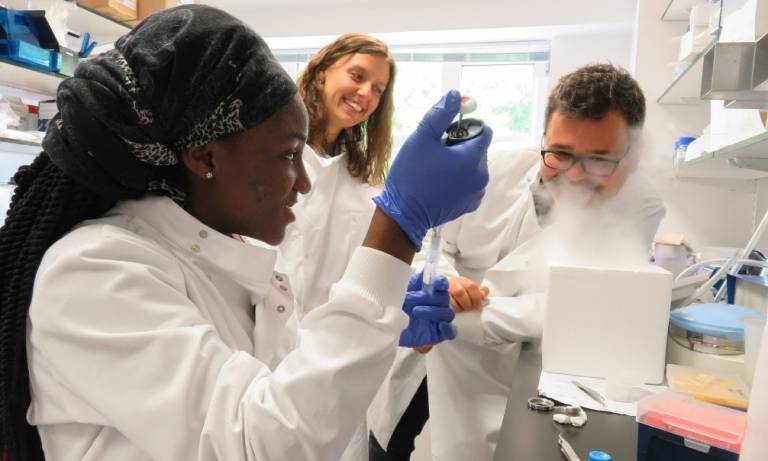UCL inspires young people to study science and get into research with in2scienceUK
13 November 2019
An inspirational programme brings local disadvantaged young people to UCL, as a part of long-term effort to encourage young people to become literate in topics in science, technology, engineering, and mathematics (STEM).

In2scienceUK, founded by UCL alumna Dr Rebecca McKelvey, provides students with research work placements, skills days and workshops, support on university access, STEM careers and employability skills. The aim is to give young people opportunities to work alongside scientists, to receive advice and information they need to successfully apply to and progress to university and STEM careers.
To date, UCL has hosted over 700 in2science students from disadvantaged backgrounds, providing insight into academic settings and cutting-edge research. In 2019 alone UCL had 91 researchers supporting 166 students across 52 departments.
“We know that poverty and social background remain huge barriers to progressing to university and high skilled STEM and research careers. Under 10% of life scientists and 15% of academics are from working class backgrounds. This is worrying as it doesn’t just lead to a waste of talent - it results in a huge under-representation of people from these backgrounds in the sector,” said Dr McKelvey.
“Research shows that diverse workforces improve problem solving, innovation and developing a pathway to social mobility for poor communities.”
Furthermore, Dr McKelvey explains that focusing on diversity could help tackle the every-growing skill shortage facing the UK, with data revealing an annual shortfall of 40,000 STEM skilled workers with the number of future technical jobs forecast to increase.
Young people who are selected to participate in the in2scienceUK programme all come from disadvantaged backgrounds; 45 per cent of students selected for the UCL program receive free school meals, while 90 percent come from BAME backgrounds.
“Being at UCL enables disadvantaged young people to see cutting edge research first hand while giving them an understanding of what university life is like which is important for each young person to see that they too can come to UCL and engage in research,” said Dr McKelvey.
Young people work on a wide variety of research projects. One student who participated in the programme said: “My in2science experience has completely pushed me out of my comfort zone. Not only did I meet like-minded people, but I also met some inspiring scientists who showed me their passion for science.”
Another student said: “The placement was enjoyable, and I learnt a lot about cancer biology. It helped me decide that research is the kind of STEM career I wish to pursue.”
Researchers gain experience of working and engaging with young person, receive a certificate of public engagement and PhD students gain 5 points towards their research log. In2scienceUK are currently seeking new UCL hosts for next year’s two-week summer placements, to sign up and for more information see the link below
Links
 Close
Close

